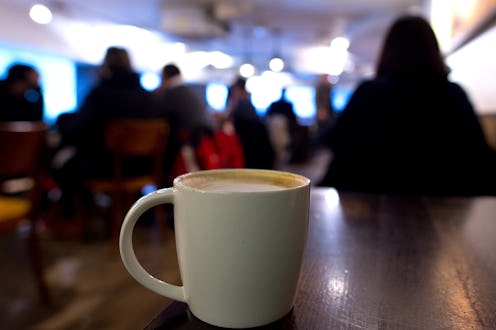Life
Are You Really Addicted to Coffee?
Most of us ingest caffeine every day, but how much do we know about the magical stuff? A new book, aptly titled Caffeinated: How Our Daily Habit Helps, Hurts, and Hooks Us , by Murray Carpenter, sheds much-needed light on this ubiquitous but still-mysterious substance. In an interview with Salon, the author gives a glimpse of what you probably don't know about caffeine.
1. How are Americans taking their caffeine?
Despite the proliferation of caffeine-containing products in recent years (including energy drinks and shots, pills, gels, and gum), we're still taking most of our caffeine in the form of good old coffee — an average of three cups a day per person.
2. Just how much caffeine are we consuming?
Difficult to say! Coffee, being a natural product, varies substantially in its caffeine content from batch to batch. Manufacturers and vendors of caffeine-containing products aren't required to label them even with a ballpark figure for their typical caffeine content — and even allegedly "decaf" coffee contains some caffeine. Maybe it's time for the United States's FDA to follow Canada's lead and require quantitative labeling of caffeine in foods.
3. Does a dependence on caffeine count as "addiction?"
This is also difficult to say. As Carpenter explains, caffeine is unlike other addictive substances in that you don't see people robbing banks to procure it (like someone addicted to opiates might do, for instance). However, as Carpenter also explains, it does shares another property of addictive substances: caffeine, for many people, is quite difficult to quit, even when they want to quit it for some reason. Perhaps addiction is better conceptualized as a spectrum, with substances like heroin and nicotine at the "very clearly and strongly addictive" end of the spectrum, and caffeine towards the mildly addictive end.
4. So, is caffeine healthy or not?
According to Carpenter, there is currently no particular reason to believe that caffeine itself will shorten your lifespan or make you otherwise unhealthy. As usual, you should be extra careful if you're pregnant, though. And sufferers from insomnia or anxiety will want to minimize their caffeine intake because of caffeine's well-known tendency to make you more awake and more alert. Otherwise, as the Mayo Clinic corroborates, a moderate amount of caffeine (that's not producing any ill effects or symptoms for you) is totally fine.
Because caffeine is mostly consumed via coffee, caffeine-lovers may also be interested in that particular beverage's healthiness. Check out some of the latest reasons that coffee is good for you.
In short: don't feel guilty about that caffeine habit of yours. If you're sleeping well at night and not feeling anxious during the day, the amount of caffeine you're consuming is almost certainly safe and doesn't constitute an "addiction" in any important sense.
Getting bored with your usual caffeine vehicles? Try some butter in your coffee: it's a thing.
